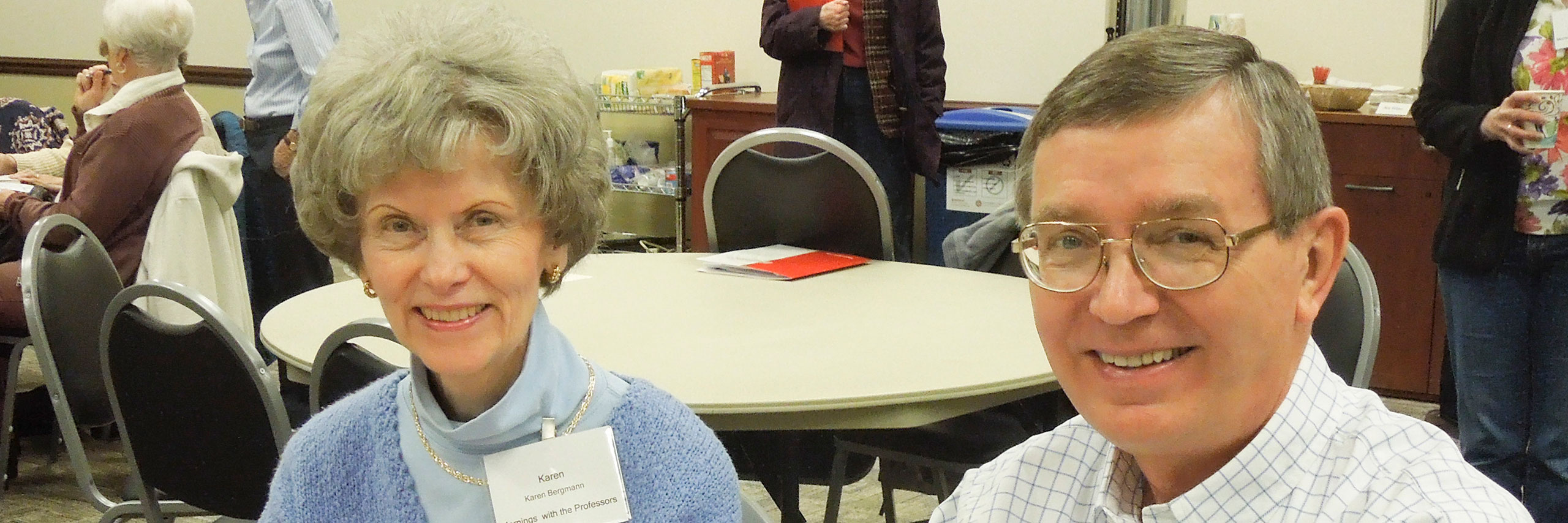Academy of Seniors

1. SAUDI ARABIA AND REINVENTION OF MODERNITY
February 3, 10, 17, 24 (Tuesdays)
1:30-3:30 pm
Saudi Arabia under Crown Prince Mohammed Bin Salman is not struggling to reconcile tension between modernity and tradition so much as reinventing the very concept of state and society. NEOM, the Saudi model "city of the future," is both a physical and social experimentation in engineering that proposes a radically different ordering of human life.
This class will examine the many projects of Mohammed Bin Salman since he gained power in 2015. Learn about his maneuvering within the Saudi royal family and his campaigns against elite rivals, his efforts to rebrand Saudi Arabia with world class entertainment as well as the ruthless control he exerts over dissident journalists, rebellious neighbors and international critics.
Janice Jayes, Instructional Assistant Professor of History, Illinois State University
2. NAVIGATING THE STATE OF HIGHER EDUCATION
March 23, 30 (Mondays), April 8, 15 (Wednesdays)
1:30-3:30 pm
For decades, higher education has been synonymous with growth — more students, more campuses, more research, more global influence. But what happens when a model based on growth reaches its natural limits?
The state of higher education in the US is one of transition. Colleges and universities are balancing their roles as centers of learning and research with demands for affordability, accountability, accessibility and relevance.
Ongoing debates about public funding, student debt, free speech on campus and the value of a college degree reflect broader questions about how higher education should serve both individual students and society as a whole. Learn how these challenges are being addressed while paving the way for future success.
Kyle Griffith (March 23), Dean of Students for Campus Life, Deputy Title IX Coordinator, Division of Student Affairs, Illinois Wesleyan University
Gabriel Spaulding (March 30), B. Charles and Joyce Eichhorn Ames Professor of Physics, IWU and 2025 President of the American Association of Physics Teachers
Sarah Diel-Hunt (April 8), Interim Provost and Vice President, Academic and Student Affairs, Heartland Community College and Chris Downing, Associate Vice President, Development and Community Engagement, HCC
Marci Rockey (April 15), Assistant Coordinator and Academic Advisor, College Student Personnel Administration Master’s Program, Instructional Assistant Professor, Educational Administration and Foundations, ISU
3. BIG BANDS: ALIVE AND WELL
March 31, April 7, 14, 21 (Tuesdays)
9:30-11:30 am
Since the beginning of jazz and throughout the changing times of music (bebop, rock and roll, fusion, etc.), big bands have endured. In this class Orcherton will touch on bands that are continuing the excitement, those that are asking what big band is and how the tradition continues. Artists will include:
- Duke Ellington, Count Basie — Often considered the defining sounds of big band. They innovated sounds and styles that are still considered as benchmarks for the genre.
- Gordon Goodwin — Considered a strong revitalizer of the style, bringing in new audiences.
- Kenny Wheeler — His unique perspective has permeated composition, arranging and improvisation for a large ensemble.
- Darcy James Argue — Following in the steps of all the previous groups, this group is on the forefront of what a big band can be.
Jenelle Orcherton, Artistic Director/Founder, Champaign-Urbana Jazz Festival
4. OLD “MASTERS”? WOMEN AND THE ARTS FROM 1400 TO 1750
April 6, 13, 20, 27 (Mondays)
1:30-3:30 pm
Historically, exceptional Renaissance and Baroque artists have been referred to as “Old Masters,” and it has been assumed that women were systemically prevented from participating in the art world except under highly unusual circumstances. However, in the last ten years, museum exhibitions and countless academic publications have demonstrated precisely the opposite.
Learn about women who worked in the arts during the Early Modern period of 1400 to 1750. Shaped by several recent and ongoing exhibitions at museums such as the Boston Museum of Fine Arts, the National Museum of Women in the Arts, and The National Gallery (London), this class will focus on artists from across Europe and in a variety of media: sculpture in marble, wood, and wax, oil painting, pastels and watercolors, paper cutting and glass engraving, printmaking and other materials often deemed outside the boundaries of “fine art.”
Saskia Beranek, Associate Professor, Art History, Wonsook Kim College of Fine Arts, ISU
